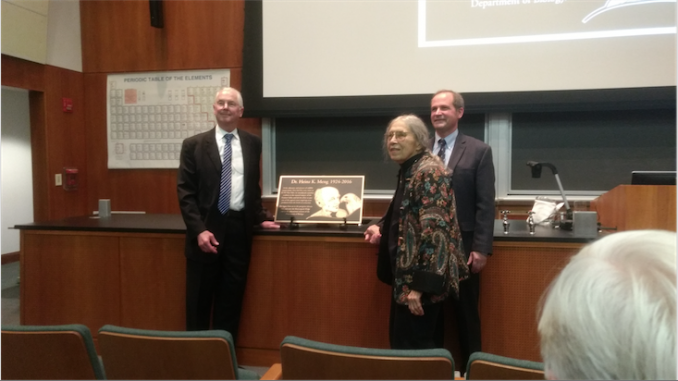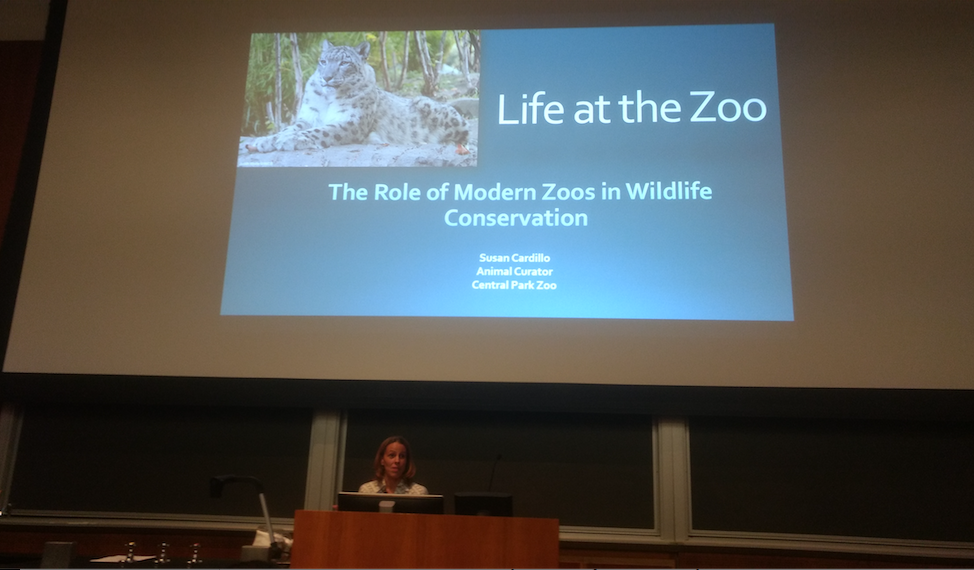
The SUNY New Paltz community came together last week to honor beloved former biology professor, ornithologist and avid conservationist Heinz Meng.
On Nov. 2 a film screening, plaque dedication and lecture by alumnae and Central Park Zoo animal curator Susan Cardillo ‘94 were held in remembrance of Meng’s contributions to the world. Along with revealing the plaque, a speech was also given by SUNY New Paltz President Donald P. Christian.
Meng died on Aug. 13, 2016 at the age of 92.
He served as a biology professor from 1951 to 2001 and then as an adjunct professor from 2002 to 2006. To many students, he was more than just a professor, he was an inspiration.
“You need to take courses with the most interesting, amazing, wonderful professors you could find, and he was one of those that you sought out,” said former student Marla Rohwer ‘74. “He was enthusiastic and just a joy to be around. I’m thrilled that they’re honoring him.”
Rohwer said that Meng inspired her to become a member of the John Burroughs Natural History Society, an organization dedicated to informing the public about nature in Ulster County.

Meng was known for his unorthodox lessons. He would often take students on field trips and falconry excursions, and even brought one of his birds into the classroom to let it fly around. Not wanting to limit exposure to his passion to just his students, he began flying falcons around campus in 1974. He would regularly continue this act until his retirement decades later.
In his lifetime, he also built up a 5,000 specimen collection of birds, mammals, amphibians, reptiles and plants for study during his decades of biological research. This collection was given to the biology department at SUNY New Paltz, who displays a portion of it in the Coykendall Science Building, hoping to catch the attention of passing students and spark their interest.
Outside of teaching, Meng is best known for his revival of the peregrine falcon in the eastern United States. Prior to his work, the peregrine was on the endangered species list due to heavy usage of pesticides like DDT in the area. DDT weakened the shells of eggs, causing them to break when incubated.
Meng became the first person to successfully breed the peregrine in captivity in 1967. His methods were widely replicated until the peregrine population rose enough for it to be taken off the endangered species list in 1999.
These accomplishments were highlighted in “The Legacy of Heinz Meng,” a short film created by alumni Paul Spaulding ‘17 and Abby Shaffer ‘17. The film explored his various contributions to the ecosystem, as well as the fame he garnered within conservation communities.
Prior to the film’s screening, a plaque dedicated to Meng was unveiled by President Christian and Meng’s widow Dr. Elizabeth “Sonny” Meng.
During her talk, Cardillo shared her experiences as a former student of Meng’s and how invaluable the hands on experience was that Meng provided.
“As soon as I met him, I was in awe,” she said. “He knew everything I was interested in, and he knew it well. I loved the relationship he had with his birds, I loved what he taught his audience and his students in his classroom, so I wanted that.”
She spent the rest of her talk discussing what zoos do in the realm of conservation. In particular, she talked about how zoos uphold and outline the American Species Survival Plan (SSP).
Developed in 1981 by the American Association of Zoos and Aquariums, the SSP is a program designed to rescue species that are going extinct in the wild and give them a chance at survival. The SSP focuses on breeding programs that will allow for reintroducing species into the wild once their population has stabilized.
Cardillo stated that her work is directly inspired by the values Meng instilled in her, and hopes that one day she can similarly inspire someone else.
